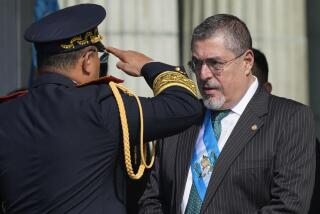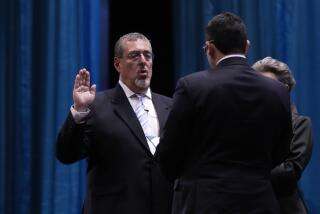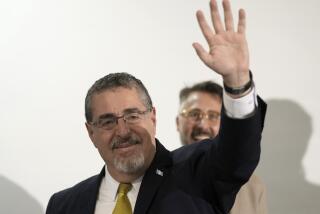Death of Turkmenistan leader creates a vacuum
MOSCOW — Turkmenistan’s President Saparmurad A. Niyazov, an eccentric leader who ruled his country with an iron hand, died suddenly Thursday, triggering a scramble for power in the gas-rich Central Asian state.
Niyazov, who used the name Turkmenbashi, or “father of all Turkmens,” was 66. State television said he died of a heart attack.
In an apparent sign of an immediate power struggle, the country’s security council announced the opening of a criminal investigation against the speaker of parliament, Ovezgeldy Atayev, who under the constitution was in line to become acting president.
Instead, the council named Deputy Prime Minister Gurbanguly Berdimukhamedov, 49, to the post. Under the constitution, a presidential election must be held within two months, and the acting president cannot be a candidate.
Turkmenistan has large natural gas reserves and is a major supplier to Western Europe. The gas is piped first to Russia, which then resells it. If political turmoil in Turkmenistan disrupted the flow to Russia, Gazprom, the Russian gas monopoly, might be unable to meet its commitments, the Russian news agency Interfax reported.
Turkmen authorities praised Niyazov’s long rule in a statement announcing his death. “The glorious years ... confirmed his heavenly faculty to foresee, and his ability to determine priorities,” they said. “His unique abilities in the art of leading the nation revealed his talent as a diplomat and a wise and humane person.”
Turkmenistan, which is mostly desert and slightly larger than California, has a population of 5 million, most of them Muslim. Any opposition to Niyazov was severely repressed, meaning there is no clear successor.
Niyazov encouraged an extravagant personality cult. He renamed the months of January, April and September after himself, his mother and the Ruhnama, a history and spiritual guide he is said to have written.
In Ashgabat, the capital, a revolving 35-foot golden statue of Niyazov is perched atop the giant Arch of Neutrality, a symbol of his policy of remaining largely isolated to avoid the potentially dominating influences of neighboring Russia, Uzbekistan and Iran. The statue’s arms are raised to welcome the sun at dawn and bid it farewell at dusk.
Some observers said a struggle over political succession might ultimately be linked to competition between the West and Russia for control of Turkmenistan’s energy resources.
“It is known that Turkey and the United States are making vigorous attempts to pursue their interests in Turkmenistan, primarily its oil and gas sector,” Leonid Ivashov, vice president of the Academy for Geopolitical Problems, a Moscow think tank, told Interfax. “If Russia chooses a passive role, it may further weaken its positions.”
Opposition rejoices
Several of Turkmenistan’s exiled opposition leaders said they would quickly try to return home.
“It is a great joy for all of us ... that he has freed the country from himself,” Avdy Kuliyev, a former foreign minister who is now an opposition leader, said in a telephone interview from Norway. “We are planning to come back to Turkmenistan in the nearest future.... We want to guide our people in a different way.
“Certainly Niyazov’s supporters who are present in the country would like to continue this same policy, possible slightly changing it,” Kuliyev said.
“As for us, we want an absolutely different policy. We want people to get freedom so they could decide themselves on their future.”
Turkmen authorities quickly tightened entry rules, with visas no longer available at airports even for those holding official invitations to visit the country, Interfax reported. Citing a law enforcement source in Kazakhstan, another neighboring country, the news agency also said that Turkmenistan’s armed forces had been put on combat alert.
Niyazov’s funeral was set for Sunday, and the country entered a period of official mourning. Streets and markets in Ashgabat fell silent, New Year’s decorations were removed, and flags were at half-staff, Interfax said.
Niyazov, born Feb. 19, 1940, was orphaned as a child. His father died in World War II and the rest of his immediate family died in an earthquake that hit Ashgabat in 1948. He rose through the Communist Party and became the party boss of Turkmenistan in 1985, when it was still part of the Soviet Union.
President for life
After Turkmenistan gained independence in 1991, Niyazov won election the next year with an official 99.5% of the vote, in balloting outsiders deemed neither free nor fair. The People’s Council, a handpicked body of loyalists, named him president for life in 1999.
Vitaly Ponomaryov, director of the Central Asia program at Memorial, a human rights group in Moscow, said Niyazov’s determination to keep all power in his hands meant he not only left no clear successor, but left no one of political strength in the government.
“There is not a single strong political figure in Niyazov’s camp,” Ponomaryov said. “Once someone’s position and role increased, then, let’s say within one or two years, that person was jailed. As a result, there is no real leader in the current government in Turkmenistan. Those who had connections, money or influence were removed from power.”
Ponomaryov predicted that some of these ousted former officials would make a bid for power at the same time exiled opposition leaders tried to return.
“Many of these people who worked in governmental structures enjoy support among some governmental groups,” he said. “Those people are also well connected with different clan groups.”
Exiled opposition leaders have some influence because their views have been carried in Turkmen-language broadcasts of U.S.-sponsored Radio Liberty, Ponomaryov said.
“Today, especially in this transitional situation, all the major countries and the whole world have a unique chance to bring pressure on Turkmenistan, which in its turn might be effective enough to help promote democratic reforms in this country,” he said.
Kuliyev acknowledged that Turkmen authorities might try to keep opposition leaders from returning, but indicated the opposition was searching for ways to circumvent any ban.
“To some extent we rely on the United States,” he said. “We want a real state to be built on democratic principles, such as freedom of speech and respect for human rights.”
*
Yakov Ryzhak of The Times’ Moscow Bureau contributed to this report.
*
(BEGIN TEXT OF INFOBOX)
Energy giant
--
The death of Turkmenistan’s president could fuel a rivalry among nations for access to the Central Asian country’s natural gas reserves.
--
*--* Natural Gas Russia U.S. Turk China Reserves, trillion cubic feet 1,688 204 102 83 Production, billion cubic ft. 21,768 19,099 2,087 1,211 Exports, billion cubic feet 7,625 680 1,533 68
*--*
*
Sources: ESRI, Associated Press
More to Read
Sign up for Essential California
The most important California stories and recommendations in your inbox every morning.
You may occasionally receive promotional content from the Los Angeles Times.










